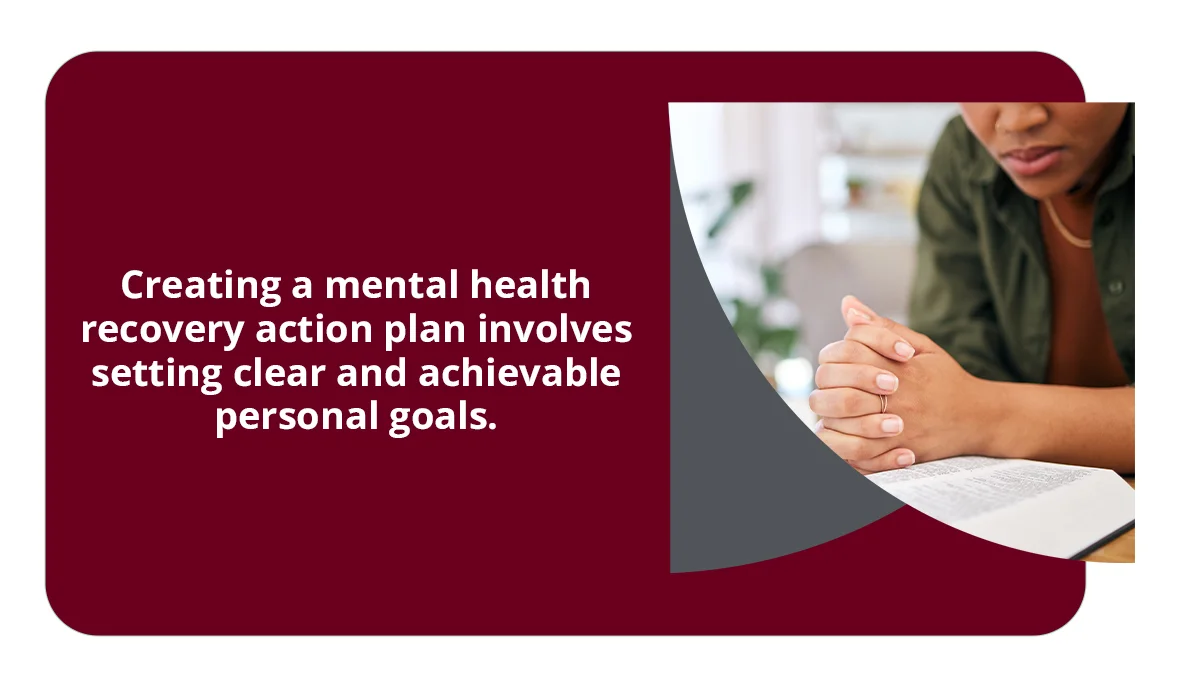
Steps To A Stronger Mind: Mental Health Recovery Action Plan
A mental health recovery action plan serves as a personalized roadmap to navigate the challenges of mental health recovery. This strategic blueprint empowers individuals by outlining specific goals, coping strategies, and support systems tailored to their unique needs. It promotes resilience and enhances overall well-being by fostering self-awareness and proactive steps.
Key Takeaways
Tailor your recovery plan to fit your needs and mental health goals. Here’s what the article entails:
- Outline specific, realistic objectives to guide your recovery journey and track your progress.
- Recognize and respond to early warning signs and triggers to prevent escalation.
- Create a crisis plan with clear steps and support contacts for immediate assistance.
In case you need assistance dealing with emotional problems, call Indiana Center for Recovery at (844) 650-0064 for more information and long-term holistic mental health care.

Creating A Mental Health Recovery Action Plan
Creating a Mental Health Recovery Action Plan involves several key steps to ensure it is comprehensive, personalized, and effective. Here’s a guide to help you create one:
Conducting A Self-Assessment
To start, conduct a self-assessment to understand your mental health. This helps you identify triggers and recognize symptoms. Knowing these can make managing your mental health easier.
Identifying Triggers
Identify what triggers your mental health issues. Triggers can be events, places, or people that cause stress or anxiety. Write them down. Knowing your triggers helps you avoid or cope with them better.
Recognizing Symptoms
Recognize the symptoms of your mental health struggles. These can be emotional, like feeling sad or anxious, or physical, like headaches or fatigue. Pay attention to how you feel in different situations. Understanding your symptoms allows you to seek help or take steps to feel better.
Setting Personal Goals
Creating a mental health recovery action plan involves setting clear and achievable personal goals. Goals give you direction and purpose, helping you stay focused on your recovery journey. They also provide a sense of accomplishment as you achieve them.
Short-Term Goals
Short-term goals are smaller, more immediate objectives you can achieve within a few days or weeks. They help you build momentum and stay motivated. Short-term goals include:
- Going for a daily walk.
- Attending a therapy session.
- Practicing mindfulness exercises each morning.
Start with simple, manageable tasks that fit easily into your daily routine. Accomplishing these goals can give you quick wins, boosting your confidence and commitment to your recovery plan.
Long-Term Goals
Long-term goals are broader objectives that take more time to achieve, often spanning several months or even years. These goals focus on your overall well-being and long-term recovery. Examples include completing an educational program, securing a fulfilling job, or maintaining a consistent exercise routine.
Break these goals into smaller, manageable steps, and set a timeline for each milestone. This approach ensures you stay on track and can measure your progress over time.
Developing A Daily Maintenance Plan
A daily maintenance plan is essential for managing mental health and preventing setbacks. This plan includes routine activities, tools, and self-care practices that promote stability and well-being.
Routine Activities
Routine activities are regular tasks that help participants structure their day and provide a sense of normalcy. Examples include:
- Getting up at the same time each day.
- Eating balanced meals.
- Engaging in regular physical activity.
Establishing a daily routine helps you stay organized and reduces stress, making focusing on your wellness process easier.
Self-Care Practices
Self-care practices nurture your mental, emotional, and physical health. Examples include:
- Practicing relaxation techniques.
- Spending time with loved ones.
- Pursuing hobbies that bring you joy.
Make time for self-care every day, and prioritize activities that help you feel relaxed and rejuvenated. By consistently engaging in self-care, you can build resilience and better cope with recovery challenges.
Identifying Early Warning Signs
Recognizing early warning signs is crucial in managing mental health. These signs help you act before things worsen, ensuring you maintain control over your well-being. Identifying these signs requires paying close attention to changes in behavior and emotions.
Behavioral Indicators
Behavioral indicators are actions or habits that change when your mental health declines. These might include withdrawing from social activities, neglecting personal hygiene, or losing interest in hobbies you once enjoyed.
You might also notice an increase in risky behaviors, such as substance abuse or reckless driving. Keeping a journal of these behaviors can help you and your support system spot patterns and intervene early.
Emotional Indicators
Emotional indicators are feelings or moods that signal a shift in your mental health. Common emotional warning signs include feeling unusually sad, anxious, or irritable. You might experience feelings of hopelessness, extreme mood swings, or an overwhelming sense of guilt. Identifying these emotional changes early on allows you to seek help and use coping ways before your condition worsens.
Creating A Crisis Plan
A crisis plan prepares you for times when your mental health takes a severe downturn. It ensures you and your loved ones know what steps to take to keep you safe.
Emergency Contacts
List your emergency contacts clearly in your crisis plan. These should include close friends, family members, or trusted individuals who can provide immediate support. Ensure they know their role and understand what they need to do if you are in crisis. Provide them with important information, such as your doctor’s contact details and relevant medical history.
Professional Resources
Include professional resources in your crisis plan. This should include contact information for your therapist, psychiatrist, and crisis hotlines. Knowing who to reach out to and having this information readily available ensures you get the professional help you need promptly. Always keep your crisis plan in an easily accessible place for quick reference.
Frequently Asked Questions (FAQ)
A Mental Health Recovery Plan outlines personalized strategies for managing symptoms and achieving wellness goals. It includes wellness tools, support networks, and treatment preferences tailored to individual needs. By fostering self-awareness and resilience, this recovery approach empowers individuals to navigate challenges, promote mental health stability, and enhance the overall quality of life.
To begin your wellness recovery action plan:
- Identify personal triggers, symptoms, and goals.
- List coping strategies, support resources, and preferred treatment options.
- Regularly review and adjust the plan as needed.
- Seek guidance from a therapist, support group, or books to refine your strategies for effectively managing mental health challenges.
Self-care practices for managing mental illness include regular exercise, adequate sleep, balanced nutrition, mindfulness meditation, setting boundaries, and engaging in hobbies or activities that bring joy.
Socializing with supportive friends or family members and seeking professional help from mental health professionals when needed are also crucial. Developing an everyday life and practicing self-compassion can promote stability and enhance overall well-being.



